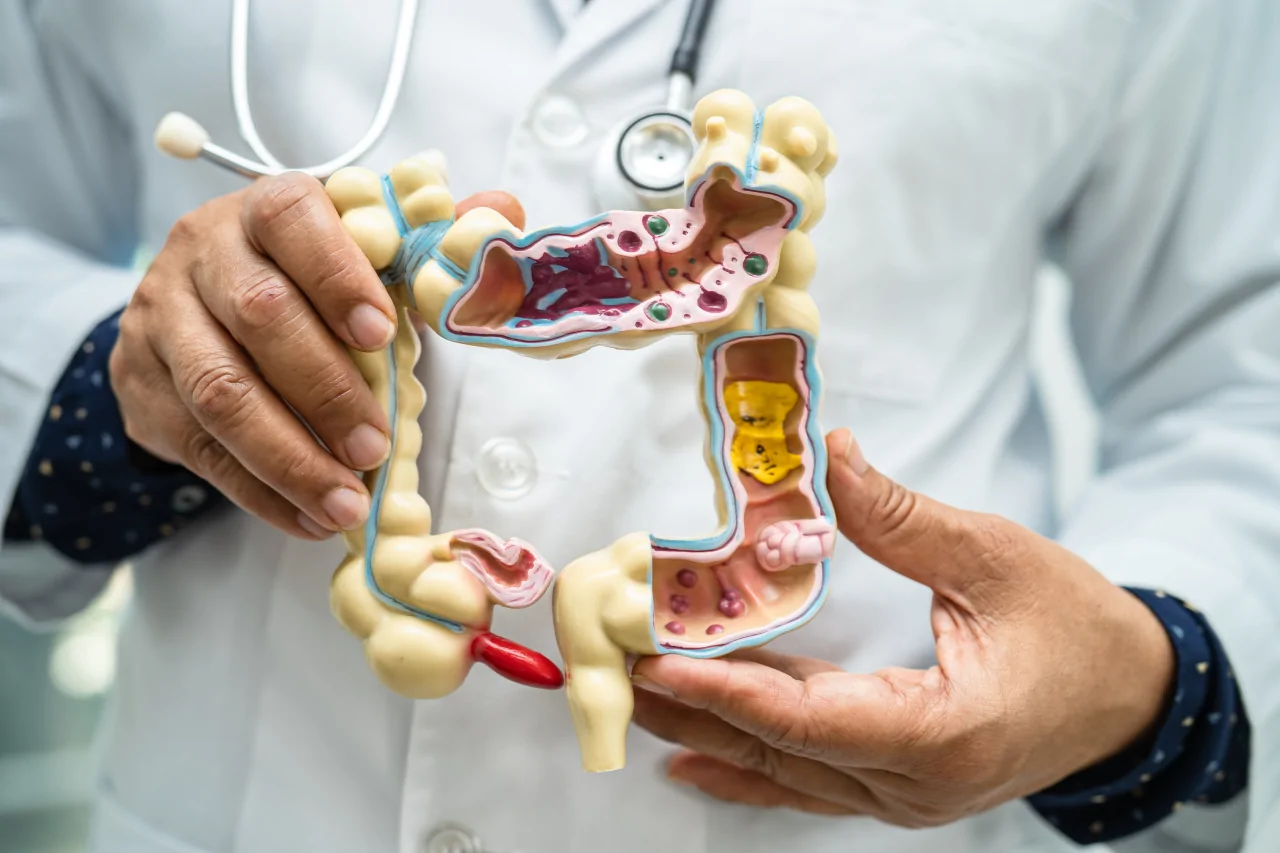Causes
Appendicitis is a condition characterized by the inflammation of the appendix, a small pouch-like structure attached to the large intestine. While the exact cause is often unknown, several factors can contribute to its development.
Here are some potential causes:
- Obstruction: A blockage in the appendix can lead to inflammation. The obstruction can occur when hardened stool, called a fecalith, accumulates in the appendix or when lymphoid tissue swells, blocking the opening.
- Infection: Infections can trigger the inflammation of the appendix. Bacterial or viral infections within the gastrointestinal tract can potentially spread to the appendix and cause appendicitis.
- Enlarged Lymphoid Tissue: The appendix contains lymphoid tissue, which plays a role in the immune system. If the lymphoid tissue becomes enlarged or infected, it can result in appendicitis.
- Trauma: Physical trauma or injury to the abdominal area, such as a blow or external impact, can cause appendicitis. Direct trauma to the appendix can lead to inflammation.
- Genetics: Some studies suggest that there may be a genetic predisposition to developing appendicitis. Individuals with a family history of appendicitis may have an increased risk of developing the condition.
It’s important to note that while these factors may contribute to the development of appendicitis, the exact cause can vary from person to person. If you suspect it or are experiencing severe abdominal pain, it is crucial to seek immediate medical attention for a proper diagnosis and appropriate treatment.
Risk factors for appendicitis:
The following factors may increase your risk of developing appendicitis:
- Age: Appendicitis is most common in children and young adults.
- Sex: Men are slightly more likely to develop appendicitis than women.
- Family history: If you have a family history of appendicitis, you are more likely to develop it yourself.
- Pregnancy: Pregnant women are at an increased risk of appendicitis, especially in the late stages of pregnancy.
- Diet: A diet low in fiber may increase your risk of appendicitis.
In some cases, it may occur without any obvious cause.
Complications
If appendicitis is left untreated, it can lead to various complications, some of which can be severe and life-threatening. Here are some potential complications of untreated appendicitis:
- Perforation: As appendicitis progresses, the inflamed appendix can eventually rupture or perforate. This can result in the leakage of infected material into the abdominal cavity, leading to a condition called peritonitis. Peritonitis is a serious and potentially life-threatening infection that requires immediate medical attention.
- Abscess Formation: In some cases, instead of rupturing, the appendix may form an abscess, which is a pocket of infected fluid surrounded by a protective wall of tissues. An appendiceal abscess can cause persistent pain, fever, and a palpable mass in the abdomen.
If left untreated, the abscess may continue to grow or rupture, leading to further complications.
- Sepsis: Sepsis is a severe systemic infection that can result from the spread of bacteria or toxins throughout the body, often triggered by a severe infection such as a ruptured appendix. Sepsis can rapidly progress and lead to organ failure, requiring immediate medical intervention.
- Peritonitis: Peritonitis is the inflammation of the peritoneum, the lining of the abdominal cavity. When the infected contents from a ruptured appendix spread into the abdominal cavity, it can cause widespread inflammation, severe abdominal pain, nausea, vomiting, and a high fever. Peritonitis is a medical emergency and requires prompt surgical intervention.
- Abscesses in nearby organs: In some cases, the infection from the ruptured appendix can spread to nearby organs, such as the liver or colon, leading to the formation of abscesses. These abscesses can be difficult to treat and may require drainage or surgical intervention.
- Intestinal obstruction: Intestinal obstruction occurs when there is a partial or complete blockage in the intestines, which can lead to severe abdominal pain, bloating, vomiting, and constipation. If left untreated, it can result in serious complications such as tissue damage, infection, or even bowel perforation.
Prompt medical attention is crucial in cases of suspected intestinal obstruction to determine the cause and appropriate treatment, which may include medication, dietary changes, or surgical intervention.
Treatment
The standard treatment for appendicitis is surgery to remove the appendix. This can be done laparoscopically, which is a minimally invasive procedure, or through open surgery.
Laparoscopic appendectomy: During a laparoscopic appendectomy, the surgeon makes several small incisions in the abdomen and inserts a thin tube with a camera at the end. The surgeon then uses the camera to guide surgical instruments to remove the appendix.
Open appendectomy: During an open appendectomy, the surgeon makes a larger incision in the abdomen to access the appendix. The surgeon then removes the appendix and closes the incision.
In some cases, surgery may not be necessary. For example, if the appendix has not burst and the infection is mild, the doctor may prescribe antibiotics to treat the infection. The doctor will then remove the appendix at a later date, when the infection has cleared.
After surgery most people recover from appendicitis within a few weeks. However, it is important to follow your doctor’s instructions carefully to prevent complications.
These instructions may include:
- Taking antibiotics to prevent infection
- Getting plenty of rest
- Eating a healthy diet
- Avoiding strenuous activity
Conclusion
Appendicitis is a condition that should not be taken lightly. It is a potentially serious medical emergency that requires prompt attention and treatment. This article has provided an overview of appendicitis, including its causes, symptoms, diagnosis, and treatment options.
It is crucial to recognize the signs of appendicitis, such as abdominal pain, nausea, vomiting, and fever, and seek immediate medical attention if these symptoms arise. Early diagnosis and treatment can prevent complications like a ruptured appendix, which can lead to a severe infection.
By understanding appendicitis and its potential impact on our health, we can prioritize early detection and timely intervention. Being educated about this condition empowers us to make informed decisions about our health and well-being. Stay vigilant, seek medical help when necessary, and take care of your appendicitis and overall health.
FAQs
What is appendicitis?
Appendicitis is the inflammation of the appendix, a small pouch-like structure located in the lower right side of the abdomen.
What are the common symptoms of appendicitis?
Common symptoms include abdominal pain, particularly in the lower right side, loss of appetite, nausea, vomiting, fever, and a feeling of being unwell.
What causes appendicitis?
Appendicitis is often caused by a blockage in the appendix, typically by fecal matter or enlarged lymphoid tissue. This blockage can lead to bacterial overgrowth and inflammation.
How is appendicitis diagnosed?
Diagnosis is typically based on a physical examination, reviewing symptoms, and medical history. Additional tests such as blood tests, urine tests, and imaging studies like ultrasound or CT scan may be performed to confirm the diagnosis.
Can appendicitis resolve on its own without treatment?
No, appendicitis usually does not resolve on its own and can worsen over time. Prompt medical attention and surgical intervention are important to prevent potential complications.
What are the potential complications of untreated or burst appendix?
Without treatment, a burst appendix can lead to infection, abscess formation, or peritonitis (inflammation of the lining of the abdomen), which can be serious and even life-threatening.
How long is the recovery period after an appendectomy?
The recovery period varies from person to person, but most individuals can resume normal activities within two to three weeks following surgery.





